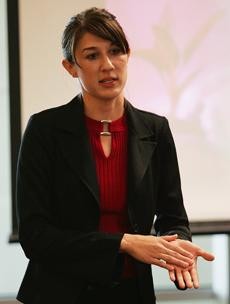The composting project, Compost Go-Live, that couldsave the UA $28,000 a year by diverting food, manure, and landscaping waste from landfills, is one step closer to becoming a reality.
Lesley Ash, ASUA sustainability director, said the university has agreed to give the project $30,000 in matching funds if they receive the Waste Reduction Assistance grant from the Arizona Department of Environmental Quality that they are applying for.
In a presentation Tuesday in the Tubac room of the Student Union Memorial Center, Ash said the total budget for the in-vessel composting project was reduced down to $125,000 from the originally proposed $475,000.
The project became so much cheaper, Ash said, because they found a new composting machine to purchase. The one they were looking into was from New Zealand, but the new one they are looking into buying is from Texas, so shipping costs would decrease significantly. Also, the new machine is less complicated and expensive. It still works just as well, said Ash, but it has less “”bells and whistles.””
Ash said the UA would receive $28,000 a year in savings alone from things like hauling and dumping charges for all the waste, and the $125,000 budget covers everything from the purchasing of the in-vessel composting unit to the labor to run it.
“”Our biggest highlight was that we did decrease the budget,”” Ash said.
The presentation included letters of support from several different departments on campus from Dining Services to the Agricultural Center.
Food waste from the Student Union Memorial Center and landscaping waste from around the university are what will be put into the compost. Ash said the cutbacks the UA is making in landscaping will not have a negative effect on the compost project. She said since there is a lot of food waste, a lack of grass and plants will be better because they will get more tree branches from landscaping.
“”We actually want more trees anyway. They are considered brown waste and help to decrease moisture,”” Ash said.
Ash said that one thing that helped this project was a collaboration, coordinated by Associated Students of the University of Arizona Senator Jason Mighdoll, between the composting team and Students in Free Enterprise.
“”We thought it would be the perfect collaboration,”” Mighdoll said.
Brittany Verloo and Sean Garza from SIFE have become involved in the project, taking care of the business side of things. They helped put together the numbers for the presentation and will also be managing the sale of the extra compost that is produced, Mighdoll said.
“”They needed help with numbers and that’s where SIFE came in,”” he said.
Profits from the sales will be divided and go to different areas and programs at the UA, but the exact divide has not yet been determined, Ash said.
“”This project would be a big step towards sustainability and it was completely student developed,”” Ash said.
Ash drove up to Phoenix yesterday to turn in the proposal to ADEQ for the grant where it will go before a board of reviewers.
The UA will be asking for $100,000 from ADEQ grant, which Ash said is the average amount that was given away to projects last year. ADEQ has a $1 million budget for grants, she said.
While the grant is not in the bag yet, Ash said they have some things working in their favor, such as the fact that the entire proposal was done by students, the large amount of waste that would be diverted by the project and that there will be less applicants this year than previous years because other applicants might have trouble getting matches with the current economic situations.
“”We’re half way there. I’m excited to turn it in and take a breath,”” she said.
Ash and the others will find out in May whether or not they will receive the grant from ADEQ and if so, Compost Go-Live can become a reality.









